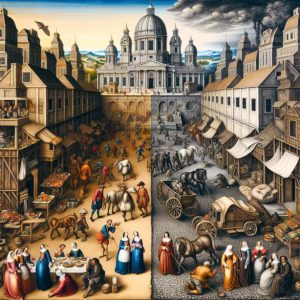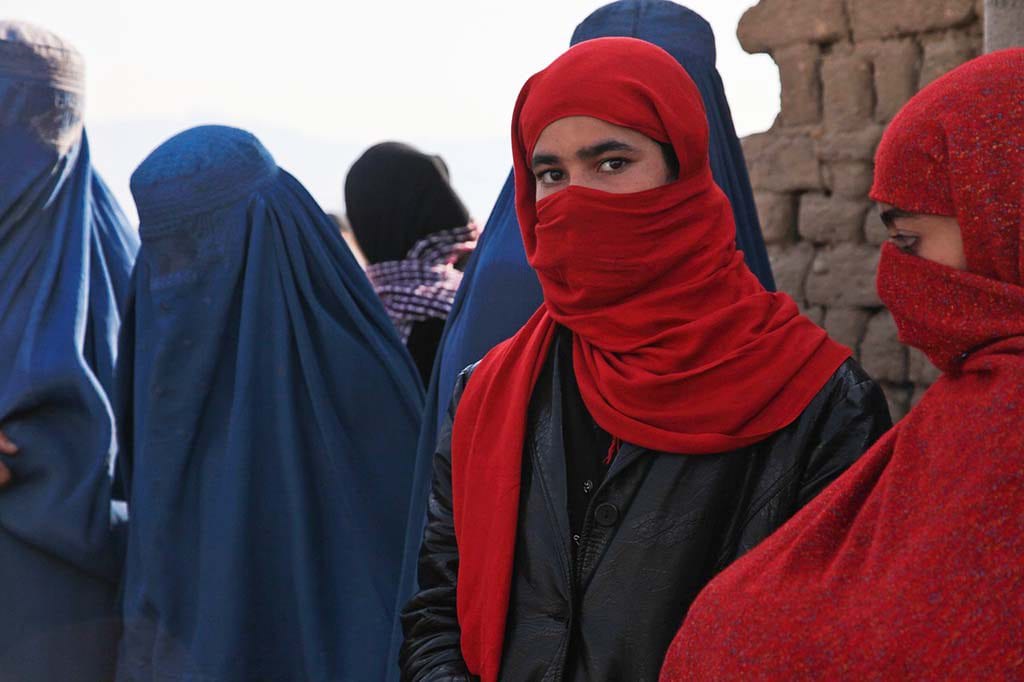African States Target Muslim Burqas
Updated Nov 11, 2023
In the ever-changing landscape of global affairs, African nations are making bold moves to redefine their cultural identities and promote inclusivity. One notable development is the reconsideration of Muslim burqas, a topic that has sparked significant debate and action across the continent.
Shifting Away from the House of Saud’s Influence
African states are increasingly distancing themselves from the influence of the House of Saud, recognizing the need to assert their values and beliefs. While Saudi Arabia’s brand of Islam once held sway in certain regions, African nations are now rejecting the restrictive black burqa, which is not a genuine symbol of Islam but rather an invention of the House of Saud.
However, it is essential to approach this topic with nuance and accuracy. While it is true that some African nations may be shifting away from certain aspects of Saudi Arabian influence, it is essential to avoid generalizations and understand that the relationship between African states and Saudi Arabia is multifaceted. Here are some points to consider:
1. Diverse Islamic Practices: Africa is home to diverse Islamic practices and traditions influenced by various historical, cultural, and regional factors. While Saudi Arabia’s interpretation of Islam has had some influence in certain regions, it is essential to recognize that African Muslims have their own distinct identities and practices.
2. Sociopolitical Considerations: African states may make decisions based on various factors, including their sociopolitical dynamics, historical ties, economic interests, and geopolitical considerations. Shifts in policy or distancing from certain aspects of Saudi Arabian influence may stem from a desire to assert national sovereignty, align with different ideological or religious movements, or address specific domestic concerns.
3. Influence of Global Islam: Islam is a global religion with diverse interpretations and practices. Various sources, including local religious leaders, historical Islamic scholarship, neighbouring countries, and international Islamic organizations and movements, influence African Muslim communities. Saudi Arabia’s influence is one of many factors shaping Islamic practices in different African nations.
4. Women’s Clothing Choices: While the black burqa (also known as the niqab) may be associated with certain interpretations of Islam, it is not exclusive to Saudi Arabia. Different Muslim communities around the world have diverse views on modesty and women’s clothing choices, which can vary greatly depending on cultural, regional, and personal factors.
5. Individual and National Choices: It is essential to recognize that individuals and nations can choose religious practices and cultural expressions. African governments may assert their values and beliefs, not necessarily in direct opposition to Saudi Arabia, but as part of their cultural, religious, and national identities.
Promoting Security and Open Communication
It is important to note that policies regarding banning burqas or face-covering garments can vary across countries and regions. While some nations have implemented such bans citing security concerns, it is essential to consider various perspectives on this issue. Here are some key points to consider:
1. Security Concerns: Arguments favour the ban often revolve around security considerations. The complete concealment of one’s face and body can make identifying individuals in public spaces challenging, raising concerns about potential security threats, criminal activities, or the ability to enforce public safety regulations.
2. Balancing Security and Individual Rights: While security is a legitimate concern for any government, it is essential to balance security measures and individual rights, including the freedom of religious expression and personal choices. Any restriction on religious attire should be carefully evaluated to ensure it does not disproportionately target specific religious or ethnic groups.
3. Alternative Security Measures: Instead of implementing a complete ban on burqas or face-covering garments, authorities can explore alternative security measures that address concerns while respecting individual freedoms. These measures may include enhanced identity verification processes, security screenings in certain areas, or regulations that temporarily require individuals to uncover their faces when necessary for identification purposes.
4. Cultural Sensitivity: Policies regarding religious attire should be approached with cultural sensitivity and an understanding of diverse spiritual practices. It is crucial to avoid stigmatizing or singling out specific religious or ethnic groups, as this can contribute to social divisions and discrimination.
5. Open Communication and Integration: Ensuring open communication and integration within society is crucial for fostering social cohesion and addressing security concerns. Governments can focus on creating inclusive environments that promote dialogue, understanding, and trust among citizens of different backgrounds. This can involve community engagement programs, cultural exchanges, and educational campaigns to promote intercultural understanding.
Celebrating Cultural Diversity and Facial Expressions
The decision to ban burqas in African nations is multifaceted, and one aspect is recognising the importance of facial expressions in interpersonal communication. While cultural diversity is celebrated and respected, the ban on burqas acknowledges the potential challenges posed by the visual barrier created by the black veil.
Facial expressions are crucial in human communication, conveying emotions, intentions, and social cues. They are fundamental to non-verbal communication, allowing individuals to establish connections, understand each other’s feelings, and engage in meaningful interactions. By restricting the visibility of facial expressions, the burqa can hinder effective communication, making it challenging to establish rapport and develop a deeper understanding between individuals.
In fostering social cohesion and unity, African nations recognize the significance of open dialogue and the importance of meaningful connections among their people. By encouraging face-to-face interactions and promoting the visibility of facial expressions, these nations aim to create an environment where individuals can connect on a deeper level, fostering mutual understanding, empathy, and a sense of shared identity.
Embracing cultural diversity does not mean disregarding certain cultural practices’ impact on interpersonal communication and social cohesion. It is a delicate balance between respecting cultural traditions and ensuring an inclusive society where individuals can effectively communicate and forge connections.
By engaging in open dialogue and encouraging cultural exchange, African nations strive to create a society where diverse perspectives and identities are celebrated while promoting understanding and unity. The ban on burqas, in this context, reflects their commitment to nurturing an environment that values meaningful interpersonal communication and fosters social cohesion.
Celebrating cultural diversity and promoting open dialogue does not imply the erasure of cultural practices but rather an understanding of the importance of effective communication in building inclusive communities. By acknowledging the impact of the visual barrier created by the burqa, African nations seek to strike a balance between preserving cultural traditions and fostering a society where individuals can connect, empathize, and forge meaningful relationships.
In this pursuit, African nations set an example for the world, demonstrating the possibilities that arise when cultural diversity is celebrated alongside the recognition of the importance of communication and social cohesion. By embracing both aspects, societies can create an inclusive environment where individuals from diverse backgrounds can thrive, contribute, and engage in meaningful interactions that transcend barriers and promote unity.
A Safer and More Progressive Future
As these African nations boldly challenge the status quo and redefine their cultural landscapes, they pave the way for a safer, more progressive future. By rejecting the influence of the House of Saud and embracing their own unique identities, these countries are asserting their independence and shaping their destinies on their terms.
The notion of African nations challenging the status quo and shaping their destinies is indeed significant in the context of cultural identity and progress. Here are some key points to consider regarding a safer and more progressive future:
1. Cultural Diversity and Self-Expression: Embracing their unique identities allows African nations to celebrate their rich cultural diversity and promote self-expression. By asserting their independence, governments can create an environment where cultural heritage and individual freedoms are respected and valued.
2. Empowerment and Self-Determination: Rejecting external influences can be seen as a form of empowerment and self-determination. African nations can define their paths, set their own priorities, and make decisions that align with their values and aspirations.
3. Gender Equality and Women’s Empowerment: Shifting away from restrictive cultural practices can contribute to promoting gender equality and women’s empowerment. By challenging norms imposed by external influences, African nations can work towards creating inclusive societies that value and empower women.
4. Progressive Societal Values: African nations have the potential to redefine societal values based on their own cultural contexts and aspirations. This can involve embracing principles of democracy, human rights, social justice, and equality, fostering a more progressive and inclusive society.
5. Regional Integration and Cooperation: African nations can also promote regional integration and cooperation by collaborating with neighbouring countries that share similar aspirations. By working together, they can collectively address common challenges, exchange ideas, and foster mutual progress.
It is important to note that progress and cultural transformation are complex processes that involve multiple factors and perspectives. The path towards a safer and more progressive future is unique to each nation, and it requires careful consideration of historical, social, and economic contexts. Embracing cultural identities and asserting independence should be done in a manner that respects diversity, inclusivity, and human rights principles.
Looking Ahead: A World of Possibilities
The ban on burqas in African nations represents just one facet of the dynamic changes shaping our world today. It serves as a testament to the ever-evolving nature of societies, where cultural norms and practices are subject to reevaluation and transformation.
African nations, in particular, have emerged as pioneers in this paradigm shift, demonstrating their resilience and determination to shape their own future in alignment with their values and aspirations. By addressing issues such as the ban on burqas, these nations are actively engaging in conversations about identity, religion, and personal freedoms, ultimately fostering a more inclusive and progressive society.
This era of evolving global dynamics reminds us that change is an inherent part of progress. Societies must adapt and respond to the challenges and opportunities presented by an interconnected world. African nations, with their rich cultural heritage and diverse populations, are at the forefront of this movement, showcasing their commitment to embracing diversity, promoting security, and nurturing open communication.
As the world watches the unfolding of Africa’s cultural renaissance, we anticipate a future characterized by vibrancy, inclusivity, and collaboration. African nations are shaping a narrative that challenges stereotypes and celebrates the unique contributions of their people. By embracing their rich cultural tapestry, they inspire us all to value our own diverse backgrounds and engage in dialogue that bridges divides and fosters understanding.
The transformative journeys undertaken by African nations serve as a powerful model for the global community. They remind us to embrace change, explore new possibilities, and seek common ground in our pursuit of a more interconnected, compassionate, and harmonious world. As we witness the progress made by African nations, we are inspired to embark on our own transformative journeys, contributing to a collective effort to build a future that honors our shared humanity.
Looking ahead, we can envision a world where cultural exchange, respect for diversity, and dialogue are the foundations of thriving societies. The steps taken by African nations in embracing change and promoting inclusivity serve as a beacon of hope and inspiration for the global community. By learning from their experiences and joining hands in a spirit of collaboration, we can collectively shape a future that embraces the multifaceted richness of our world and celebrates the boundless possibilities that lie ahead.
Deeper Dive into Compelling Narratives

Mass Media: Prime Examples of Stupidity

Unleashing Passion: The Intriguing Realm of AI Sex Bots

How Did Yellow Journalism Contribute to the Spanish-American War?

The Working Poor The Price of the American Dream-Dreams Shattered

Next Global Crisis: Currency Wars and the Race to the Bottom

Hidden Bullish Divergence RSI: Uncover Powerful Buy Signals

BMY Stock Forecast: Exciting Upswing or Daring Downturn?

Housing Bubble 2008: Revisiting Hell and Brimstone

Protect Your Savings Now: How to Buy Gold US Money Reserve

A Key Difference Between Saving and Investing: Huge Capital Gains

Fiat Currency Collapse: The Inevitable Countdown

Stock Market Forecast for Next Decade: Pure Guesswork

Contrarian Thinking: The Power of Challenging the Status Quo

Small Dogs of the Dow Strategy: Small Dogs Packing a Big Bite

Be Free & Fly: How Avoiding Debt Can Lead to Financial Freedom and Hope
Dow theory no longer relevant-Better Alternative exists



